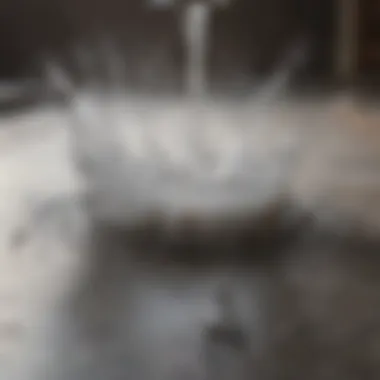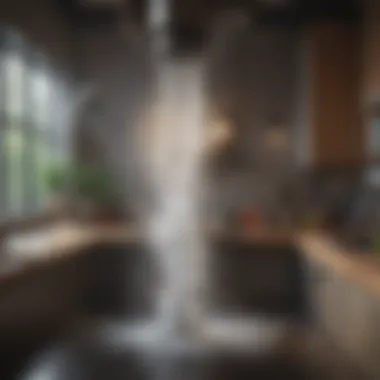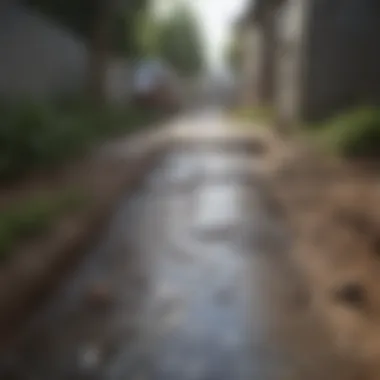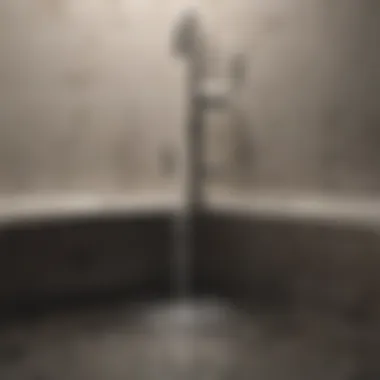Exploring the Efficacy of Boiling Water for Drain Unclogging


The Science Behind Using Boiling Water to Unclog Drains
Pouring boiling water down a drain is a method often touted as a solution for unclogging pipes. It is essential to understand the rationale behind this household hack. When hot water is poured down a drain, it can help dissolve and dislodge greasy substances and soap scum that may be causing blockages. The heat from the boiling water can aid in breaking down these substances, potentially clearing the drain. However, one must exercise caution when using this method to prevent any damage to the pipes.
How Boiling Water Can Influence Drainage
Best Practices for Utilizing Boiling Water
To effectively unclog a drain using boiling water, follow a systematic approach. Firstly, ensure there are no standing liquids in the sink or tub to prevent any splashing accidents. Boil water in a kettle or pot until it reaches a rolling boil to harness its full cleaning potential. Slowly pour the boiling water down the affected drain, allowing it to work its way through the pipes. It is advisable to repeat this process if the blockage persists, but exercise patience and caution to avoid any mishaps.
Precautions and Alternatives to Consider
While pouring boiling water down a drain can be an effective unclogging method, it may not be suitable for all situations. Some piping materials, such as PVC, may not withstand the high temperatures of boiling water, leading to potential damage. In such cases, consider alternative methods like utilizing a drain snake or environmentally friendly enzymatic cleaners to safely remove blockages. Prioritize understanding the composition of your plumbing system to avoid causing unintended harm.
Introduction
Pouring boiling water down a drain is a common household method used to resolve clogs effectively. It serves as a quick and potentially cost-effective solution for dealing with drain blockages without resorting to chemical cleaners or professional assistance. The process involves understanding the science behind this approach and knowing when and how to implement it appropriately in different scenarios to achieve optimal results.
Understanding Drain Clogs
Causes of Drain Clogs
Drain clogs can occur due to various reasons, such as the accumulation of debris, grease buildup, or foreign objects blocking the pipes. Understanding the specific causes of drain clogs is instrumental in addressing the issue effectively. By identifying the factors contributing to clogs, homeowners can tailor their unclogging methods to target and eliminate the root cause, preventing future blockages efficiently.
Types of Drain Clogs
Different types of drain clogs exist, each requiring a unique approach for effective unclogging. From organic matter buildup to mineral deposits, the type of clog can impact the choice of unclogging method. By categorizing drain clogs based on their composition and severity, individuals can select the most suitable technique, such as utilizing boiling water, chemical drain cleaners, or plunging, to dislodge and remove the obstruction with precision.


Common DIY Solutions
Boiling Water Method
The boiling water method is lauded for its simplicity and eco-friendliness in unclogging drains. By pouring boiling water directly into the drain, it can help dissolve grease and organic matter, effectively loosening the blockage. This method is suitable for minor clogs and regular maintenance to keep drains flowing smoothly without the need for harsh chemicals.
Chemical Drain Cleaners
Chemical drain cleaners are potent solutions designed to break down tough clogs quickly. While effective in unclogging drains, they come with potential risks, such as damaging pipes and harming the environment. Homeowners should exercise caution when using chemical cleaners and consider them as a last resort for severe blockages that other methods, like boiling water or plunging, cannot resolve.
Plunging Techniques
Plunging is a traditional yet effective method for dislodging clogs by creating pressure within the pipes. By using a plunger correctly and maintaining a strong seal around the drain, individuals can forcefully push air or water through the pipes to break apart the obstruction. This technique is valuable for stubborn clogs that require mechanical force to clear, complementing the use of boiling water or other DIY solutions.
Purpose of the Study
Investigating Boiling Water's Effectiveness
The primary aim of this study is to evaluate the effectiveness of pouring boiling water down a drain as a DIY unclogging method. By examining how boiling water interacts with different types of clogs and analyzing its impact on various blockages, the study aims to provide homeowners with evidence-based insights on when and how to utilize this method optimally. Investigating boiling water's effectiveness not only sheds light on its practical applications but also highlights its advantages and limitations compared to alternative solutions, guiding individuals in making informed decisions for maintaining their drainage systems.
Scientific Explanation
In delving into the scientific explanation behind pouring boiling water down a drain to unclog it, we unearth crucial insights that illuminate the effectiveness of this common household method. Understanding the scientific basis elevates this approach beyond mere folk wisdom, shedding light on how heat interacts with clogs and aids in the breakdown of obstructive materials. By comprehending this process, homeowners can grasp the underlying principles guiding the use of boiling water to tackle drain blockages.
Mechanism of Action
Heat's Impact on Clogs
The pivotal role played by heat in unclogging drains cannot be overstated. Heat, emanating from boiling water, exerts a transformative influence on clogs by softening and disintegrating the substances causing the obstruction. This thermal energy acts as a catalyst, loosening the grip of materials within the drain and facilitating their dislodgment. Heat's ability to dissolve and weaken the mass of the clog positions it as a favored option for drain unclogging endeavors.


Breaking Down Organic Materials
The act of breaking down organic materials within a drain represents a fundamental aspect of the unclogging process. Boiling water, through its intense heat, aids in decomposing organic matter present in clogs. By effecting this breakdown, boiling water targets the root cause of many drain blockages, offering a natural and chemical-free solution that is gentle on the environment. This attribute of boiling water aligns with an eco-conscious approach to resolving drainage issues.
Temperature Considerations
Ideal Boiling Point
Examining the concept of the ideal boiling point underscores the essential temperature range required to maximize the unclogging potential of boiling water. Achieving the correct boiling point ensures that the water's heat energy is at its peak, optimizing its ability to tackle stubborn clogs effectively. Understanding and maintaining this temperature threshold are critical in harnessing boiling water's full unclogging prowess.
Avoiding Damage to Pipes
While boiling water is a potent tool for unclogging drains, caution must be exercised to prevent potential harm to pipes. Careful consideration of the type and condition of plumbing fixtures is imperative to avert any adverse consequences. By respecting the limitations of pipes and implementing preventive measures, such as avoiding prolonged exposure to extreme heat, homeowners can safeguard their plumbing systems from damage.
Comparative Analysis
Effectiveness vs. Chemical Cleaners
When pitted against chemical cleaners, the effectiveness of boiling water in unclogging drains shines through. Unlike harsh chemicals that pose risks to both health and the environment, boiling water offers a safe and sustainable alternative. Its natural composition and non-corrosive properties make it a preferred choice for individuals seeking a greener approach to drain maintenance. Comparing boiling water with chemical cleaners unveils its superiority in efficacy and environmental friendliness, positioning it as a compelling option for combating drain blockages.
Best Practices
When it comes to unclogging drains using boiling water, adhering to best practices is crucial for achieving optimal results and ensuring safety. One of the primary elements to focus on is the temperature of the boiling water. It is essential to reach the ideal boiling point to effectively break down clogs without causing damage to the pipes. This method is highly effective when dealing with organic materials that are causing the blockage. By understanding the science behind the process, homeowners can confidently utilize boiling water as a viable solution to unclog drains.
Safety Precautions
Protective Gear


Protective gear plays a vital role in ensuring the safety of individuals when pouring boiling water down a drain. The key characteristic of protective gear lies in its ability to provide insulation and protection against the hot temperature of the water. This gear is a popular choice for this article as it prevents accidental burns and ensures that the individual handling the boiling water remains unharmed. One unique feature of protective gear is its thermal resistance, which enables it to withstand high temperatures. While protective gear offers numerous benefits, it is essential to be cautious of its limitations, such as potential discomfort due to prolonged use.
Proper Handling of Boiling Water
Proper handling of boiling water is paramount to avoid accidents and injuries during the unclogging process. The key characteristic of this aspect is maintaining a steady grip on the container holding the boiling water and ensuring a controlled pour. This method is beneficial for preventing splashes or spillage, which can lead to burns or damage to surrounding objects. A unique feature of proper handling is the use of insulated gloves or tools to enhance grip and minimize the risk of heat-related incidents. While effective, proper handling requires attentiveness and caution to prevent any mishaps that may occur during the unclogging procedure.
Optimal Usage
Timing and Frequency
Determining the appropriate timing and frequency for pouring boiling water down a drain is essential for achieving successful results. The key characteristic here is to identify the early signs of a clog and address them promptly to prevent a severe blockage. This proactive approach can help maintain the efficiency of the drainage system and reduce the need for extensive unclogging procedures. One unique feature of timing and frequency is the ability to incorporate boiling water as a preventive measure on a regular basis, which can help maintain clear drains and prevent future blockages. While beneficial, it is crucial to avoid overusing this method to prevent any potential damage to the pipes.
Preventive Maintenance
Incorporating preventive maintenance strategies can significantly contribute to the effectiveness of using boiling water for unclogging drains. The key characteristic of preventive maintenance is the implementation of routine inspections and cleaning practices to prevent clogs from forming. This proactive approach can prolong the lifespan of the drainage system and reduce the occurrence of major blockages that may require professional intervention. One unique feature of preventive maintenance is the use of homemade solutions, such as baking soda and vinegar, to maintain clean drains and minimize the buildup of debris. While advantageous, homeowners should be mindful of the frequency of preventive maintenance to avoid excessive strain on the drainage system.
Conclusion
Pouring boiling water down a drain can be a transformative solution for unclogging, providing a simple yet effective method to address common household issues. The significance of incorporating this technique lies in its accessibility and natural approach towards resolving drain blockages. By harnessing the power of heat, homeowners can tackle clogs without relying on harsh chemicals or complex tools, making it a cost-effective and eco-friendly option. Considering the potential risks associated with other unclogging methods, such as chemical cleaners that may harm pipes and the environment, embracing boiling water as a viable solution signifies a step towards sustainable and responsible home maintenance.
Summary of Findings
Boiling Water as a Viable Solution
One of the key aspects of boiling water as a viable solution lies in its simplicity and effectiveness. The straightforward nature of this method, involving the use of only water and heat, makes it an accessible choice for homeowners seeking a quick fix for drain clogs. The remarkable ability of boiling water to break down organic materials obstructing drains sets it apart as a natural and non-invasive alternative to conventional unclogging techniques. Its gentle yet powerful action on blockages showcases why boiling water is a preferred option, providing a safe and efficient way to maintain optimal drain function.
Recommendations for Homeowners
When considering recommendations for homeowners, the focus shifts towards promoting the regular use of boiling water as a preventive measure against clogs. Incorporating a monthly routine of pouring boiling water down drains can help proactively dislodge buildup and prevent future blockages, minimizing the need for more aggressive interventions. Additionally, emphasizing the importance of using proper protective gear and handling boiling water with care underscores the importance of safety in executing this method. By integrating boiling water treatments into routine maintenance practices, homeowners can ensure the sustained efficiency of their drainage systems.
Future Implications
Potential Research Areas
Exploring potential research areas related to the impact of boiling water on unclogging opens up opportunities for further understanding the mechanisms behind this simple yet effective solution. Investigating the ideal temperature ranges for boiling water to maximize its unclogging potential, as well as its long-term effects on different types of plumbing systems, could provide valuable insights for enhancing this method. Additionally, delving into the development of specialized tools or techniques that complement the use of boiling water in resolving stubborn clogs could lead to innovations in home maintenance practices. By continuously advancing research in this field, it is possible to refine the efficacy and safety of using boiling water for unclogging, benefiting homeowners seeking sustainable and efficient drain maintenance solutions.



